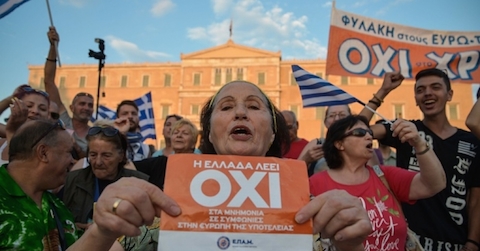Antonis Vradis and Hara Kouki: Our "no" means a "yes"


Photo: NurPhoto/REX Shutterstock/NurPhoto/REX Shutterstock)
It's a strange thing, hope. Five years ago, it made the sound of acronyms like the IMF, EU and EBC sound soothing to Greeks as the country’s first troika agreement was announced. Memorandum after memorandum, measure after measure, hope that things would get “better” was persistent. As we watched the elderly scrape through dustbins for food, as we saw scores of the younger ones taking off in one-way flights out of the country, as we were losing our right to labour, our capacity to take care of our parents and children, of our beloved ones, as we were losing our faith and trust in each other and in ourselves, in our agency to shape our lives. Soon enough, hope that things would come back to normal turned into hope they'd get somewhat better and then, that things wouldn’t get too bad. We often stood puzzled at this strange force that held us together and kept us going while we were losing everything, this religious-like belief in a system that had clearly stopped functioning some time ago.
At this moment, five years on, it is precisely this belief that is put on the line. As we head to Sunday’s referendum there seem to be enough of us here in Greece ready to express a crucial realisation: the realisation that the memoranda and austerity measures were never meant to work, and that the new series of measures proposed by the "institutions" (the European Commission, European Central Bank and IMF) have nothing to do with any national debt or fiscal policies. That the promise of an end to the crisis, postponed into an indefinite future, only serves to extend this crisis, to transform our nightmarish present into a taken-for-granted normality.
A “yes” vote on Sunday will deepen and prolong this irrational present, in the hope of averting complete catastrophe. But for those of us voting “no”, this hope no longer works. We have no concrete plan and we are not unanimous in any way; we have, simply enough, made a choice between repetition and abrupt change—change that opens up not to chaos and disorder, as the “yes” proponents would have it, but to some still ambiguous potential.
This ambiguity opens up what a “no” on Sunday will mean to each of us, but what we will all share through it is a reclamation of our agency, our capacity to say "no". It us who will say no to austerity and its killer certainties; it is us who will decide how we want our lives to be, it is us who will do away with this fatal common sense and come up with a new one; it is us who will rediscover justice, fairness and responsibility. It is us who will frame a question in which to answer “yes”.
It will be frustrating, agonising, tremendously difficult—perhaps already doomed. And yet, at the same time, the process will be truly alleviating, liberating, giving us back something of the agency lost in these bleak crisis years. A “no” vote on Sunday will not be about any concrete plan, it won't be about Syriza, it won't be about the euro, and it won't even be about Greece alone. It will be about so many of us seeing our lives wither away and being expected to get used to it. Not just over here: in the housing evictions in Spain, in the benefit cuts in the UK, at the EU borders all over... Might there be another way to imagine our coexistence on this old, shared continent of ours? Our “no” may just open up a window to a “yes”.